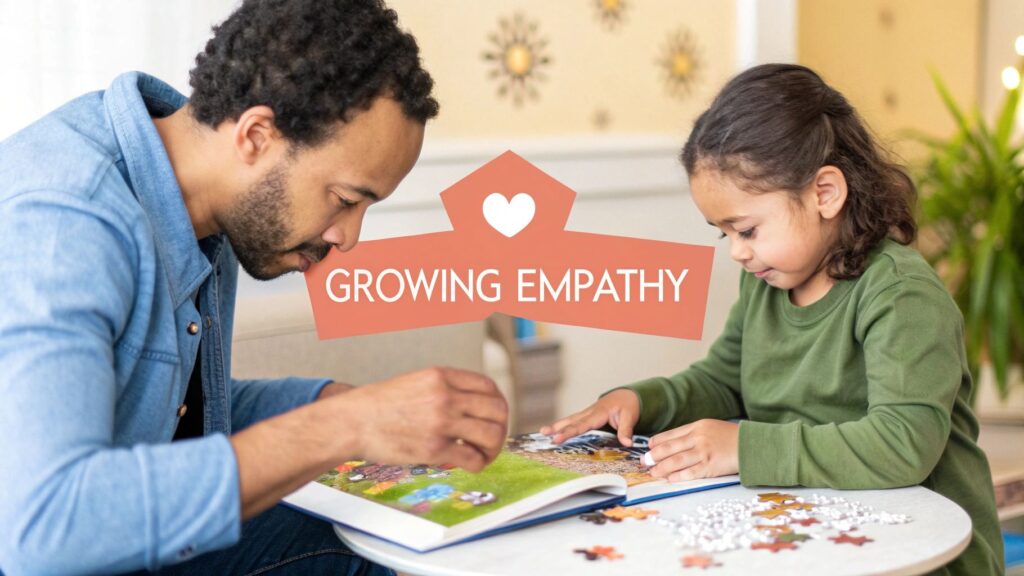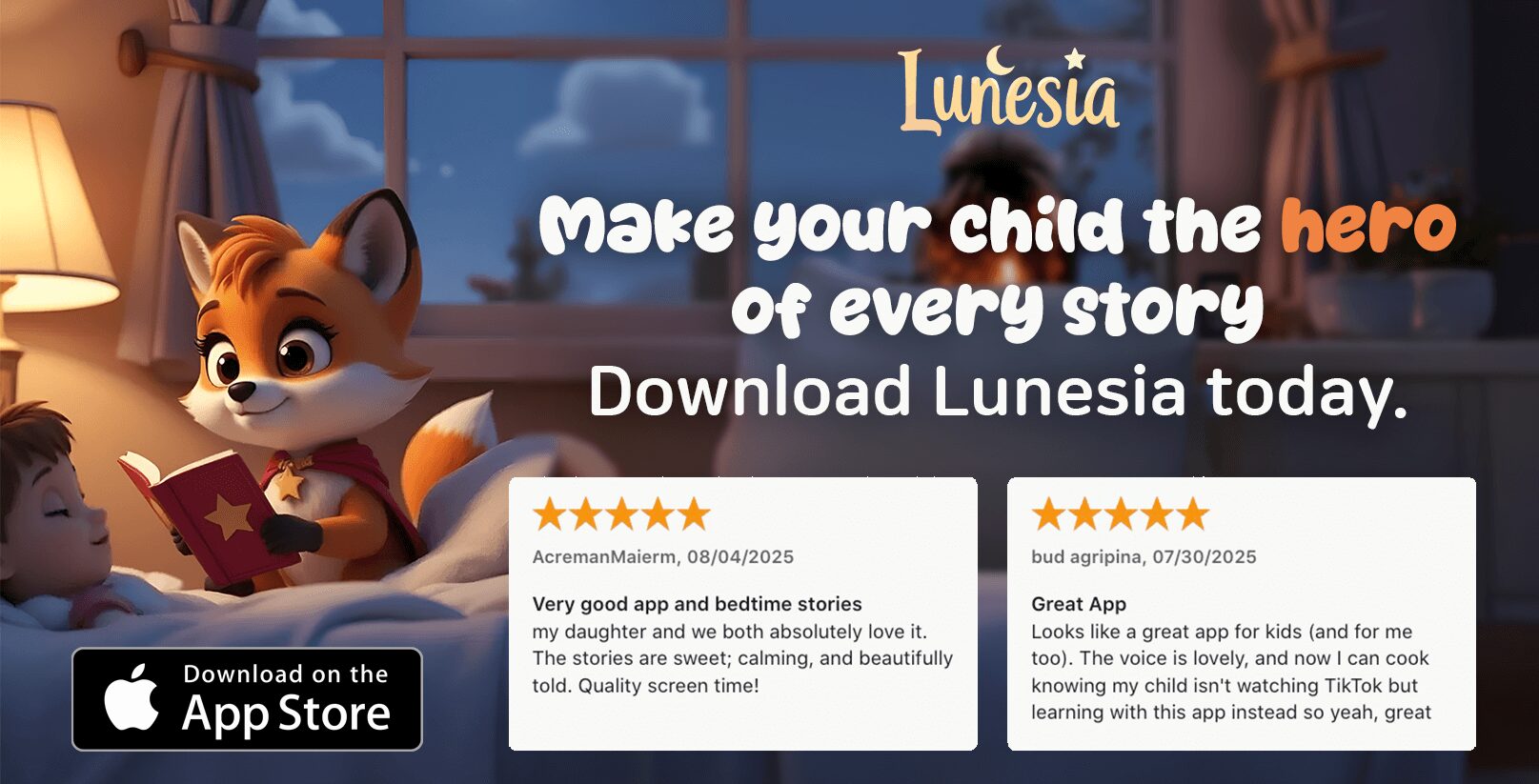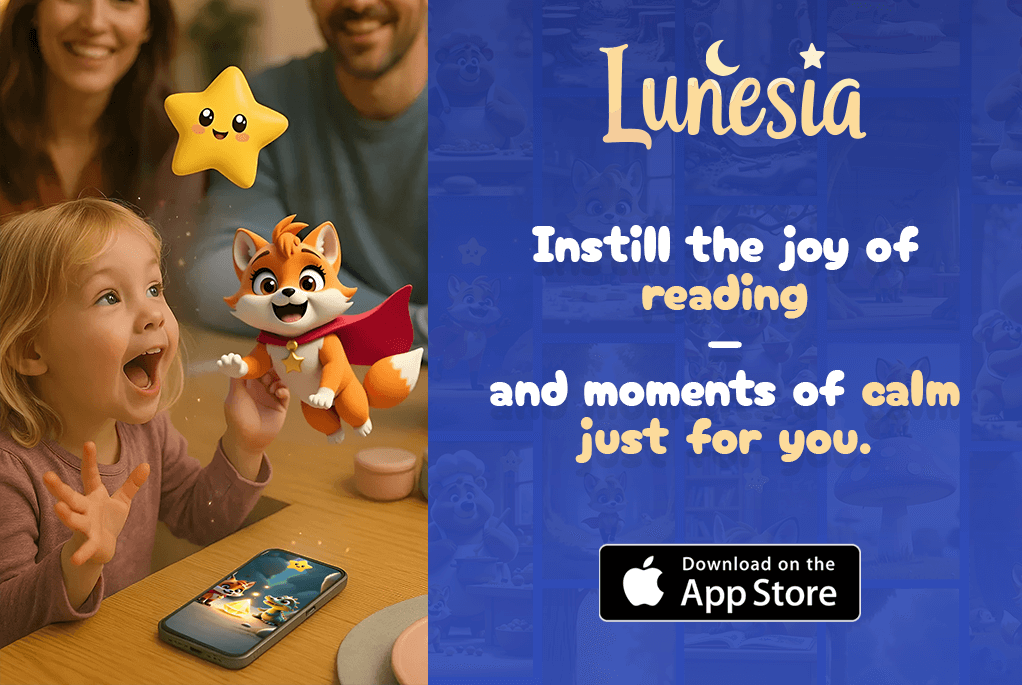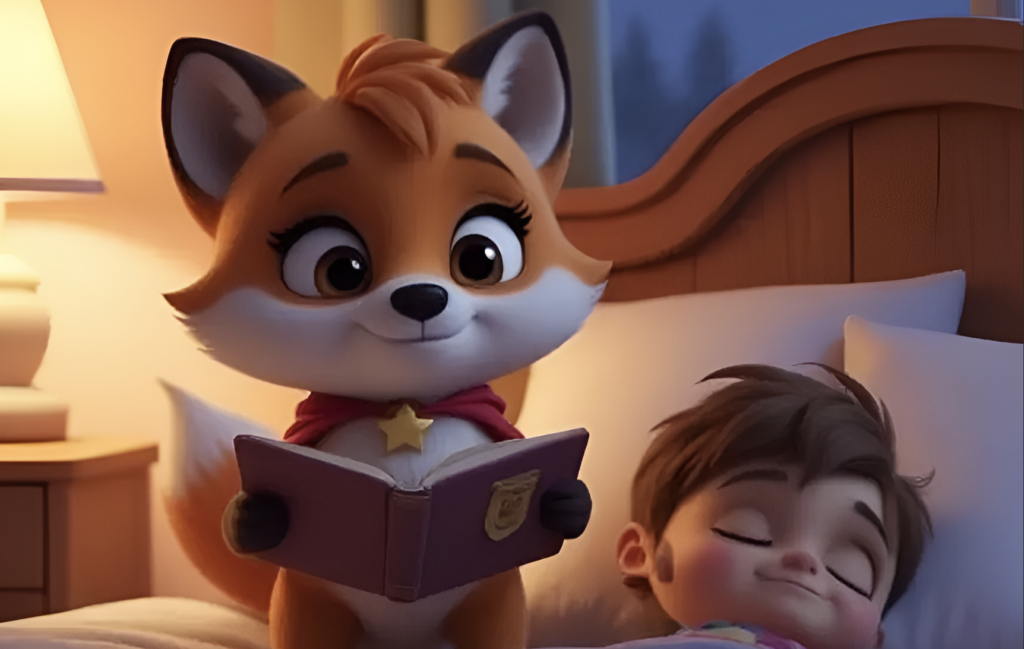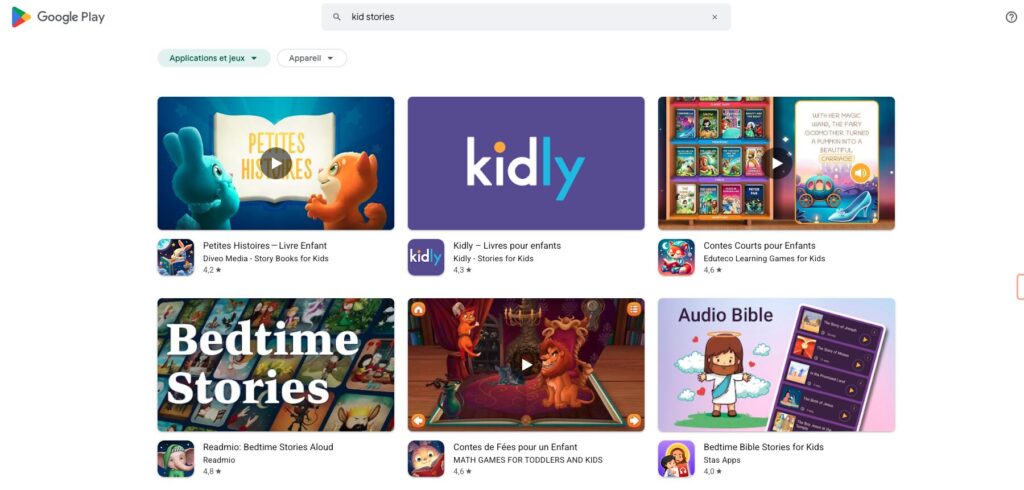Ever wonder how your little one goes from being the center of their own universe to a kind, caring person who understands others? It’s not about memorizing rules. It's about building that inner voice—that moral compass—that will guide them for the rest of their lives.
And guess what? You're front and center for this incredible transformation. Let's walk through it together, one real-life moment at a time.
What Sparks Your Child's First Moral Choices
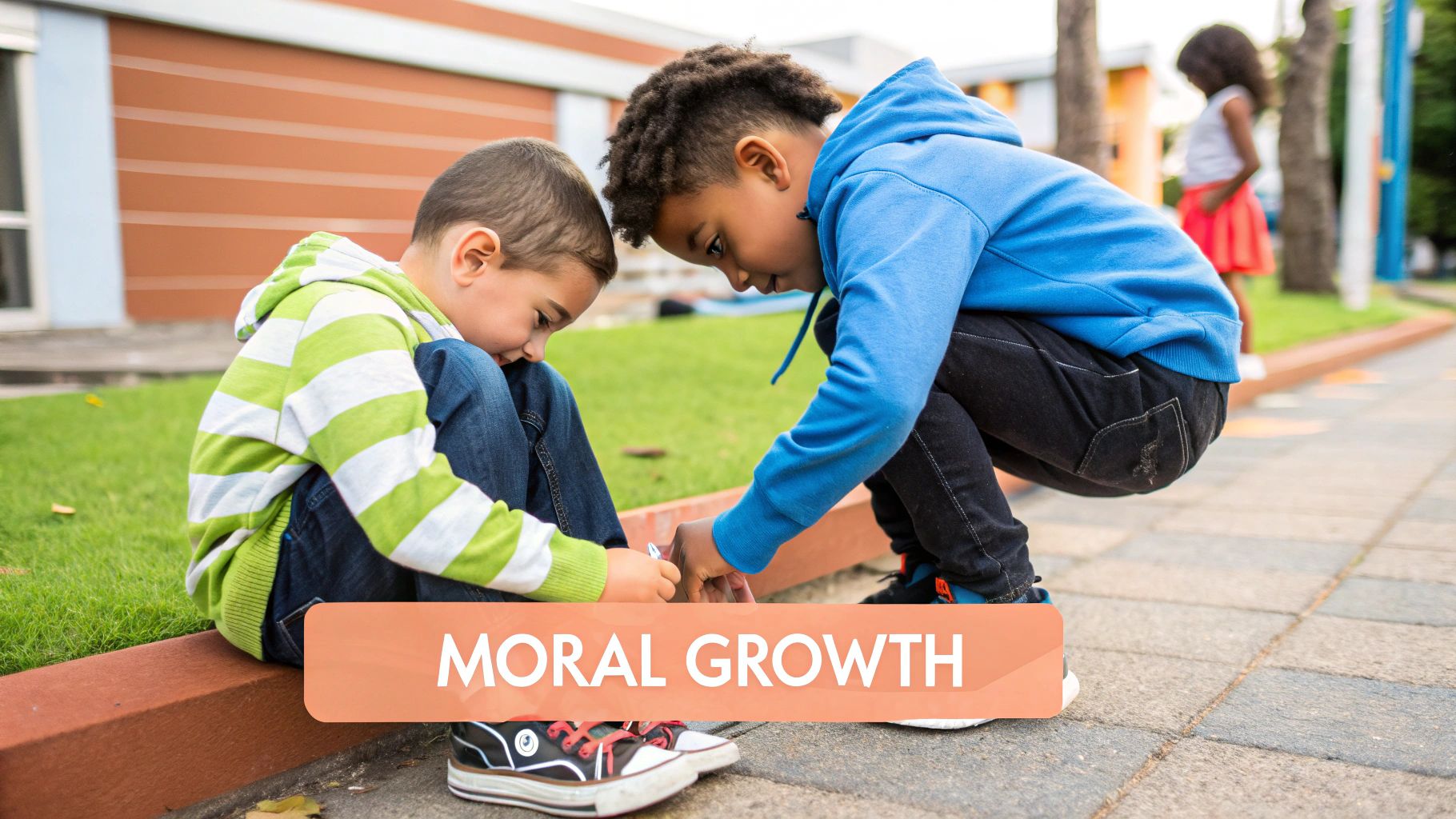
Have you ever stopped to wonder what’s really going on when your child suddenly decides to share their most prized teddy bear? Or why a simple "no" can feel like the end of the world to a four-year-old? You're not just navigating a tantrum; you're witnessing the very first sparks of moral development.
These early years are all about laying the foundation for fairness, kindness, and empathy. Think of yourself as the gardener, nurturing the roots of what will one day be a strong, compassionate, and resilient person. It all happens one small, teachable moment at a time.
Why Everyday Moments Matter Most
Do you ever feel like character is built in big, dramatic lessons? The real secret is that the most powerful work happens in the messy, beautiful, and sometimes frustrating moments of daily life. The spilled juice, the squabble over a crayon, the sudden fear of a shadow on the wall—these aren't interruptions. They're opportunities.
Every single one is a chance to teach fairness, resilience, and empathy. Here’s what you’re really building, piece by piece:
- Empathy: The magic of understanding how someone else feels. When your child rushes to comfort a crying friend, that’s empathy in action.
- Fairness: That first grasp of taking turns or making sure everyone gets the same number of crackers. It’s their first step toward understanding justice.
- Honesty: Learning that telling the truth is important, even when it’s scary. This is a cornerstone of trust and integrity.
- Kindness: Those small, gentle acts, like helping set the table without being asked or petting the family dog softly.
Turning Screen Time into a Moral Gym
Let's be real—sometimes you just need a break. But what if that screen time could do more than just pass the time? What if it could actually build character? This is where an app like Lunesia completely changes the game. It’s not about passively watching a cartoon; it's about stepping into a story.
In Lunesia's interactive adventures, your child is the hero making the tough calls. Imagine them deciding whether to help a lost creature in the forest or figuring out how to share their digital supplies to build a bridge. These aren’t just bedtime stories; they’re a safe space to practice being kind and brave.
And the best part for you? While they're lost in a meaningful, value-rich adventure, you gain precious time for yourself, totally guilt-free. You know they're learning and safe in an ad-free environment. To see how this works in practice, you can learn more about how children's stories help build a strong moral compass.
Decoding the Logic of a Young Child's Choices
Have you ever been completely baffled by your child's reasoning? One minute they’re a model of generosity, sharing their favorite snack, and the next they’re fiercely protecting a broken crayon like it’s priceless treasure. If that sounds familiar, welcome to the fascinating, and often confusing, world of a young child’s moral logic.
This isn’t random behavior; it’s a sign of incredible cognitive growth. One of the biggest leaps your child makes between ages four and seven is shifting their focus from just the outcome of an action to the intention behind it. It’s a subtle but powerful change that unlocks a whole new level of understanding right before your eyes.
From Spilled Milk to Good Intentions
Imagine this common scene: Your five-year-old, Alex, accidentally knocks over a tower his friend was building. The friend immediately bursts into tears, seeing only the tragic outcome—the ruined masterpiece. Alex, however, is likely to defend himself by shouting, “But I didn’t mean to!”
This is a milestone moment. Your child is beginning to grasp that why someone does something is just as important as what happens.
At this stage, your child isn't just making excuses. They are genuinely trying to separate accidental harm from purposeful harm. Recognizing and validating this is a parenting superpower that turns potential conflicts into powerful learning opportunities about empathy and forgiveness.
And this isn't just wishful thinking from parents. Research confirms it. A study published in the journal Child Development showed that by age 5, a child's moral judgments become significantly more intention-based. They don't just see the broken tower; they are fully capable of considering the intentions behind the action. You can discover more insights about how children process these concepts in the full research.
How to Nurture This Budding Moral Logic
So, how can you support this critical shift in thinking? It’s all about guiding their perspective and giving them the right tools to explore these big ideas.
- Narrate the Intention: When an accident happens, be the narrator. Say, “Oh, you were trying to hand her the cup, but it slipped. That was an accident.” This gives them the language to understand and explain their own good intentions.
- Ask "Why" Questions: Instead of focusing on the "what," gently probe the "why." Ask, "Why do you think he took your toy?" This encourages them to consider another person’s perspective and motives—a key part of building strong critical thinking skills.
- Create a Safe Space for Mistakes: Reassure your child that accidents are not moral failures. This helps them feel safe enough to be honest and builds their resilience when things inevitably go wrong.
Turning Screen Time into a Moral Sandbox
This is where the right kind of engagement can make a huge difference. How do children learn best? Through play and stories. An app like Lunesia offers a perfect sandbox for moral development. Their interactive stories aren't just entertainment; they’re engaging journeys where children make decisions that shape the adventure.
For example, a character in a Lunesia story might accidentally break a friend's prized possession. Your child then gets to choose how the character responds. Do they hide the mistake? Do they apologize and offer to fix it?
By making these choices in a safe, fictional world, your child is actively practicing empathy, problem-solving, and honesty. They get to experience the consequences of their decisions firsthand, learning that good intentions and thoughtful actions lead to better outcomes.
While your child is immersed in these value-rich adventures, you get precious time for yourself—without a shred of guilt. You know their screen time is actively building their character, teaching them kindness and courage in a completely ad-free environment. It’s a win-win that supports both their moral development and your well-being.
The Journey from a World of 'Me' to a World of 'We'

Does the soundtrack of your home often feature the powerful, one-word anthem, "Mine!"? If you're nodding along, you’re not alone. That passionate declaration of ownership is a universal—and completely necessary—part of growing up. But then, almost without you noticing, a quiet magic starts to happen. "Mine" slowly makes room for "yours," and eventually, the beautifully complex concept of "ours."
This is one of the most incredible journeys a child takes: the great migration from a world of 'me' to a world of 'we'. It’s the slow, wonderful shift from a self-centric universe to the dawning realization that other people have feelings, thoughts, and perspectives, too.
So, how do you know this monumental shift is happening? It’s not a single event but a series of small, heartwarming moments. It’s the first time your four-year-old sees a friend fall and, without prompting, rushes over to offer a hug. It’s when they try to give you a bite of their cookie because you mentioned you were hungry. These aren’t just cute anecdotes; they are the first visible sprouts of genuine empathy.
Is My Child Selfish?
This is a worry that whispers in the ear of nearly every parent. When you see your child snatch a toy or flat-out refuse to share, it’s easy to fast-forward in your mind and imagine you’re raising a tiny tyrant. But here’s the reassurance you need: these behaviors are not signs of a moral failing. They are simply stepping stones.
A toddler’s brain is wired for self-preservation and for learning about the world, which includes the tricky concept of ownership. Before they can ever truly understand sharing, they first need to grasp what it means to possess something. Their fierce cries of "Mine!" are them practicing this fundamental idea. You can help them along this journey by nurturing your baby's social development, which lays the foundation for their moral compass.
Nurturing Their Growing Empathy
You can’t force empathy, but you can create the perfect conditions for it to blossom. It’s less about big lectures and more about gentle, consistent guidance woven into your daily life.
- Label the Feelings: When you see another child crying at the park, you might whisper, "He looks so sad. I think he misses his mommy." This connects an observation to an emotion, building their emotional vocabulary.
- Talk About Perspectives: Use characters in books or shows to your advantage. Ask questions like, "How do you think the little rabbit felt when the fox took his carrot?" This invites them to step into another’s shoes from a safe distance.
- Model Compassion: Let them see you being kind. When you thank the grocery clerk, help a neighbor, or comfort a sad friend, you are giving them the most powerful lesson of all—no words required.
Developmental studies actually confirm this journey has deep roots. By around 9 to 12 months, infants are already responding to the intentions behind people's actions. By the time they are preschoolers, they can evaluate behavior by considering what someone meant to do, not just what happened. This shows their growing ability to think about what's going on in someone else's head.
An Empathy Gym in Their Hands
What if you could give your child a safe, playful space to practice these budding social skills every single day? This is where an app like Lunesia becomes more than just screen time; it becomes an empathy gym. The interactive stories are specifically designed to build this compassion muscle.
In a Lunesia adventure, your child doesn't just listen to a story about kindness—they make the kind choice. They get to decide to help the scared squirrel, share their virtual water with the thirsty flower, or comfort the lonely dragon. They see firsthand how their decisions positively impact the characters around them.
This isn’t a lecture; it's an experience. They feel the warmth of making a good choice, which helps wire their brain to associate empathy with positive feelings. For parents, this is a game-changer. You get precious, guilt-free time for yourself, knowing your child isn't just being entertained. They are safely immersed in an ad-free world, actively learning how to be a better friend and a more compassionate person.
Your Practical Toolkit for Raising a Kind Child
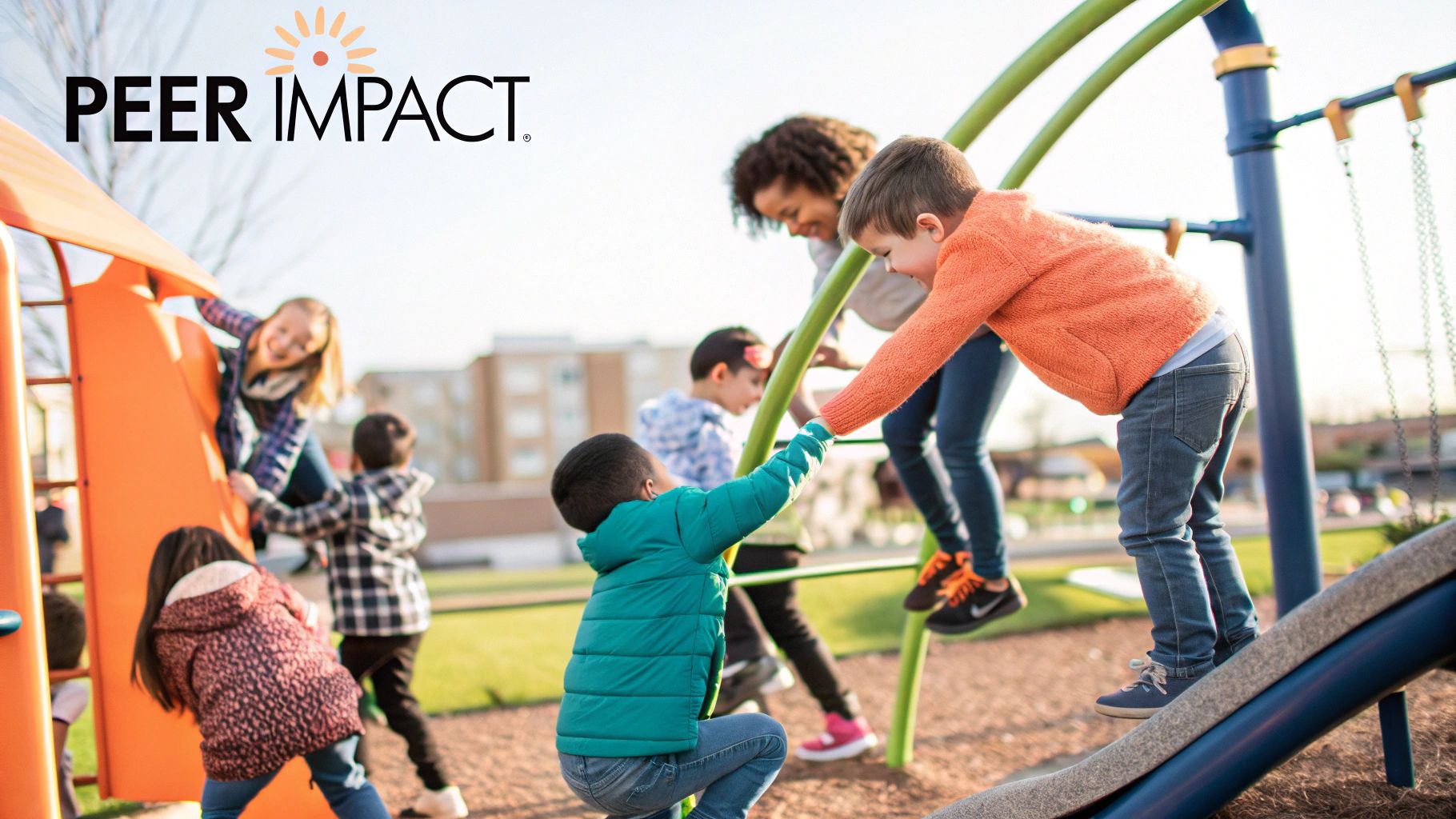
Knowing the theories is one thing. But what do you do when your three-year-old has a complete meltdown over a cookie? Or when a peaceful afternoon erupts into a sibling squabble over a single toy car?
This is where the real work happens. It’s in these messy, beautiful, and often frustrating moments that we guide our children's moral development. Welcome to your go-to toolkit, packed with strategies you can use the moment you finish reading.
From Tantrums to Teachable Moments
Ever feel like you’re just a professional tantrum negotiator? It’s exhausting. But believe it or not, those big, overwhelming emotions are actually golden opportunities for learning. When a child is upset, their brain is primed for connection.
Instead of the classic, "Stop crying, it's not a big deal," try getting on their level and validating what they feel. A simple script like, "You are so sad that playtime is over. I understand. It’s hard to stop when you’re having fun," can feel like magic.
Why does this work? It does two crucial things:
- It shows them you get it. This builds trust and helps calm their frazzled nervous system.
- It gives them words for their feelings. This is the very first step toward learning how to manage those feelings on their own down the road.
Using positive reinforcement techniques for children is also a game-changer here. When they successfully calm down, even for a second, notice it. "Wow, you took a deep breath. That was a great choice."
The Sharing Dilemma Solved
Are you tired of forcing your child to share, only for it to end in more tears? Let's be honest, forced sharing often backfires because, to a toddler, it feels like an unfair punishment. So, let's reframe it.
Instead of "sharing," let's talk about "turn-taking." This concept feels much fairer to a young child's developing sense of justice.
Try introducing a timer or a simple visual cue. "You can play with the truck for three more minutes, and then it will be your sister’s turn." This tiny shift in language empowers them by giving them predictability and a sense of control, which are key ingredients for cooperation.
Parenting Insight: Your goal isn't just to stop a fight over a toy. It's to teach the foundational skills of fairness, patience, and respecting others' desires—the very building blocks of a strong moral compass.
Turn Screen Time into Your Secret Weapon
Let’s be real: sometimes you just need a break. But the guilt that comes with plopping your child in front of a screen can be intense. What if you could transform that screen time into a powerful character-building experience?
This is where an app like Lunesia becomes a parent’s secret weapon. Imagine this: instead of your child passively watching cartoons, they are the hero of an interactive adventure. They aren’t just being entertained; they are actively making decisions that shape the story’s outcome.
- Practicing Kindness: Will they choose to help a lost, little fox find its way home?
- Building Courage: Will they decide to face the spooky-but-friendly dragon in the cave?
- Learning Empathy: How will they respond when another character is sad or needs help?
These aren't just taps on a screen; they are moral choices practiced in a safe, consequence-free environment. Lunesia's stories are essentially "empathy simulators," allowing your child to practice being the kind, brave, and thoughtful person you hope they'll become.
For you, this means something incredible: guilt-free time for yourself. While your child is immersed in a meaningful, ad-free adventure, you can finally drink your coffee while it's still hot. You’re not just buying time; you're investing in their moral development while reclaiming a piece of your own well-being.
Parenting Scenarios and Actionable Responses
To make this even more practical, let's look at a few common scenarios. It's easy to react in the heat of the moment, but a small shift in our response can make a huge difference in the lesson our child learns.
| Common Challenge | Common Reaction | Moral-Building Response |
|---|---|---|
| Child hits a sibling over a toy. | "No hitting! Go to your room!" | "I see you're very angry. It's okay to be angry, but it's not okay to hit. Let's use our words. What did you want to say?" |
| Child refuses to help clean up. | "If you don't clean up, you'll lose your toys." | "We are a team in this family, and we help each other. I'll start with the blocks, which part do you want to start with?" |
| Child tells a small lie (e.g., "I didn't eat the cookie"). | "Don't lie to me! I know you did it." | "It can feel scary to tell the truth sometimes. I will always love you, even when you make a mistake. Let's try telling the truth together." |
This table is a quick-reference guide for those tough moments. The goal isn't perfection, but progress. By choosing a response that focuses on teaching rather than punishing, we help build that internal moral compass, one small moment at a time.
Using Stories to Build a Strong Moral Foundation
Have you ever noticed how a child’s eyes light up at the phrase, “Once upon a time…?” It’s pure magic. The stories we tell our kids do so much more than just entertain; they are one of the most powerful tools we have for shaping their understanding of the world and building their moral compass, piece by piece.
Think about it. A lecture on why it’s important to be honest can often go in one ear and out the other. But a story about a little bear who gets into trouble for telling a fib, and then feels the warmth of relief when he finally tells the truth? That’s a lesson that sticks. Stories create a safe, imaginative space for children to explore big, complicated feelings—like jealousy, courage, or kindness—without any real-world pressure.
Stories as Practice for Real Life
When your child listens to a story, they aren't just a passive audience. Far from it. They are actively putting themselves in the character's shoes, feeling their dilemmas, and mentally rehearsing what they would do in that same situation. This is exactly why a well-told story is often far more effective than a direct command.
This isn't just a hunch; it's backed by research showing how children’s ability to draw moral lessons from narratives grows as they get older. A longitudinal study confirmed that a child's capacity to pull morals from fables improves with age, highlighting just how crucial storytelling is for shaping their moral reasoning. You can explore the full findings on how narrative shapes children's cognitive growth.
This infographic shows how experts track these developmental milestones, using everything from simple observation to more structured tasks.
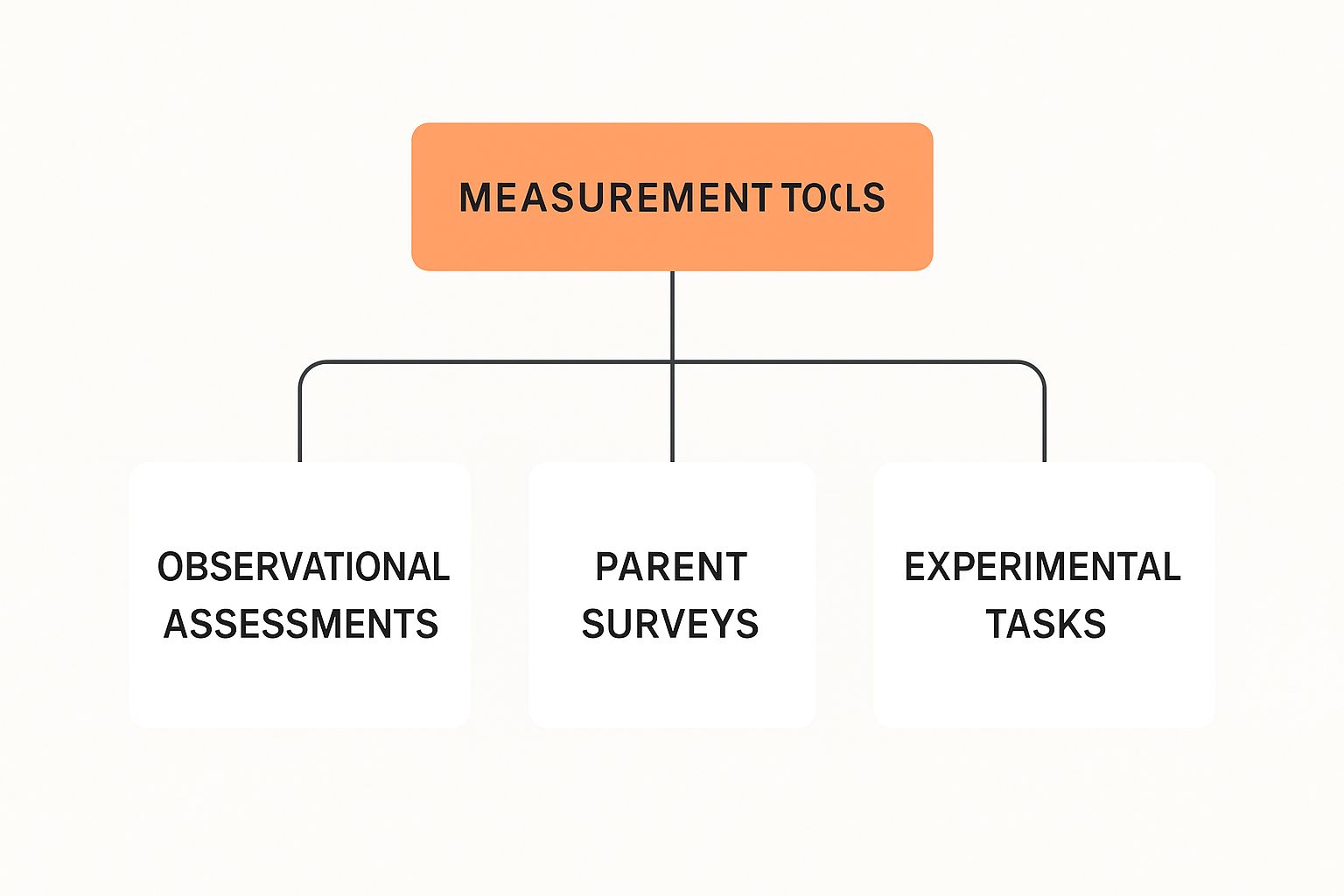
As the diagram shows, really understanding a child's moral growth involves a blend of direct observation, parental insight, and carefully designed activities.
Making Stories Interactive and Impactful
So what if you could take this incredible learning tool and make it even more effective? That’s where interactive storytelling comes in, and it’s a total game-changer for parents who want to instill strong values without the constant lectures.
An app like Lunesia turns stories into dynamic practice grounds for life. The adventures aren't just bedtime tales—they are engaging, value-rich journeys where your child is the hero.
Instead of just hearing about a character who has to be brave, your child gets to make the brave choice. They decide whether to help a lost creature, share their supplies with a friend in need, or stand up for what's right. Each choice shapes the adventure, showing them the tangible impact of their decisions.
This isn’t just tapping on a screen; it’s an active moral choice. They are wiring their brains for empathy, courage, and problem-solving, all within a safe, ad-free environment.
The Ultimate Win-Win for Parents
Let’s be honest—parenting is demanding, and finding a moment for yourself can feel impossible. The guilt of using screen time as a babysitter is real. But what if you could flip that script entirely?
When your child is immersed in a Lunesia story, you can finally take that much-needed break without a shred of guilt. You know they aren't just being entertained; they are actively learning the values you hold dear. It’s meaningful screen time that builds character while you recharge.
- You get precious time back. Enjoy your coffee, answer an email, or just breathe for a few minutes.
- Your child gets a "moral workout." They are practicing kindness, resilience, and critical thinking in a fun, engaging way.
- Family life becomes more balanced. You feel more in control, knowing you have a tool that supports both your child’s development and your own well-being.
Common Questions on Moral Development, Answered
Navigating a young child's moral world can feel like trying to read a map in a language you're just learning. You see the big picture, but the day-to-day journey is full of twists and moments that leave you wondering, "Did I handle that right?"
If you've ever felt that way, you're not alone. Let's tackle some of the most common questions that pop up for parents, offering clear, reassuring answers to help you guide your little one with confidence.
My Three-Year-Old Refuses to Share. Is This a Moral Failing?
Have you ever watched your sweet, loving child transform into a tiny dragon hoarding treasure the second another kid eyes their favorite truck? Does it mean they’re destined for a life of selfishness?
Take a deep breath. Absolutely not. In fact, this is a classic, age-appropriate, and even necessary stage of their development.
At three, kids are just mastering the very concept of ownership. Before they can truly grasp the idea of giving something away temporarily (sharing), they first need to feel secure in the idea that something belongs to them. To their still-developing brain, being forced to share can feel like a genuine, permanent loss.
Forcing it often backfires, creating resentment instead of generosity. So, what can you do? The best approach is to model sharing yourself and reframe the language. Instead of demanding they "share," try introducing "turn-taking."
Saying, "It's your turn for two minutes, and then it will be Sarah's turn," introduces fairness and predictability without the pressure. It’s a powerful way to build their understanding of cooperation from the ground up.
How Should I React When My Five-Year-Old Tells a Small Lie?
Discovering your child has told their first lie can feel like a punch to the gut. Are they dishonest? It’s a scary thought, but the first step is to stay calm. Young children often lie for reasons that have little to do with malicious intent.
Instead, their little fibs are often driven by things like:
- Wishful Thinking: "I did clean my room!" (Because I really, really wish I had.)
- Avoiding Disappointment: "I didn't break the vase." (Because I don't want you to be mad at me.)
- Blurry Lines: A five-year-old's vibrant imagination can sometimes blur the line between what really happened and what they imagined happening.
The key is to avoid shaming them or backing them into a corner with a direct "Did you do this?"—a question that practically invites a lie. Instead, state the facts calmly: "I see the cookie from the jar is gone."
Then, focus on the value you want to teach and finding a solution. "In our family, it's really important to tell the truth, even when it's hard. Let's talk about why you wanted that cookie so much." This approach teaches responsibility and reinforces that honesty is safe, all without creating fear.
Can Screen Time Actually Help Moral Development?
This is the big question, isn't it? The guilt around screen time is real for so many of us, but what if we could reframe it? The answer is a resounding yes, screen time can support moral development—but it all comes down to the quality. There's a world of difference between passive entertainment and active engagement.
Passive screen time is like being a passenger in a car. Active, interactive screen time is like being the driver. This is exactly where an app like Lunesia comes in. It’s designed to be "active time" where your child isn't just watching a story unfold; they are participating in it.
Lunesia transforms the screen into a safe, dynamic playground for character-building. When your child makes choices about being kind, brave, or helpful and sees the immediate outcomes, they aren't just playing a game. They're practicing empathy in a consequence-free environment.
This transforms screen time from a passive babysitter into a dynamic moral workout. It gives you a guilt-free break, knowing your child is learning and growing in a safe, ad-free world. They get immersed in meaningful adventures, and you get precious, well-deserved time for yourself.
What Is the Most Important Thing I Can Do for My Child's Moral Growth?
With all the theories, strategies, and tools out there, what is the one thing that truly matters most? It's simpler and more profound than you might think.
The single most powerful tool you have for fostering your child's moral development is your own behavior. Children are master observers. They learn far more from watching how you live your life than from anything you tell them.
- They see how you treat the server at a restaurant.
- They hear how you talk about a neighbor when you think they aren't listening.
- They watch how you apologize to your partner when you make a mistake.
- They feel the empathy you show when a friend is having a tough day.
When you consistently model kindness, honesty, and compassion, you provide them with a living, breathing blueprint for how to be a good person. Your everyday actions are the most profound lessons you will ever teach. They are the true north of your child’s emerging moral compass.
Ready to turn screen time into a powerful tool for building character? With Lunesia, your child steps into magical adventures where their choices teach them kindness, courage, and empathy. Give your child a world of meaningful stories and give yourself the gift of guilt-free time. Discover the magic today at https://lunesia.app.
